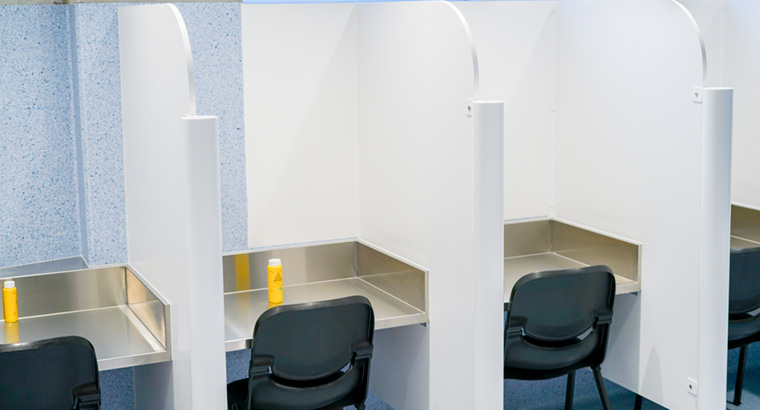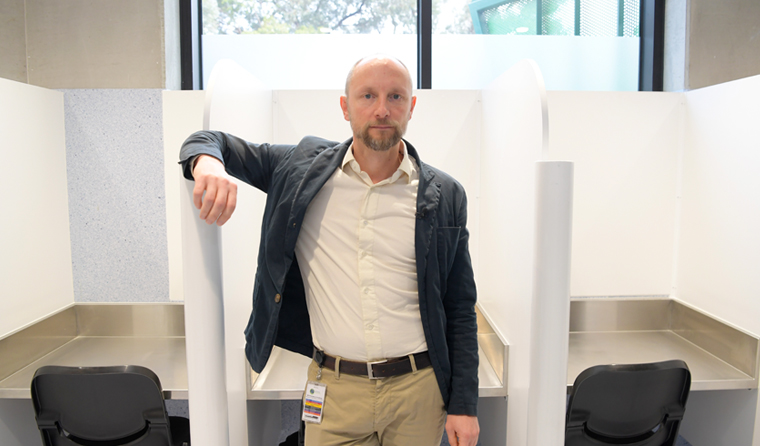Feature
Inside North Richmond’s safe injecting room
Dr Nico Clark, Medical Director of North Richmond’s safe injecting room, takes newsGP through the facility as it approaches its sixth month of operation.
 North Richmond Community Health, where the facility is housed, sits within the so-called ‘rectangle of death’, where as many as 20% of all Victorian heroin-overdose deaths occur. (Image: Joe Castro)
North Richmond Community Health, where the facility is housed, sits within the so-called ‘rectangle of death’, where as many as 20% of all Victorian heroin-overdose deaths occur. (Image: Joe Castro)
‘There’s a heaviness about this room that is reflective of the drug. It’s not a party room.’
Dr Nico Clark, Medical Director of North Richmond’s medically supervised injecting room (MSIR), makes this observation as he leads a tour of the facility.
The room he is talking about – the injecting room itself, the focus of so much controversy and now empty of clients – looks bright and clinical. Unremarkable.
It features rows of cubicles, each with a chair and a bench, separated by dividers, almost like an office, perhaps a place where telemarketers would ply their trade.
But while most of the room looks clean and new – it has only been open since July last year – Dr Clark points to the black scuff marks on the lino flooring beneath the cubicles, evidence of the many clients who have entered this room, and of the high demand for the service it provides.
The need for the room is evident in other ways – in the code blue alert issued at North Richmond Community Health, the centre in which the MSIR is located, before the tour begins, inciting centre staff to run to the carpark to attend a potential overdose. (Note: there have been no deaths in the carpark since the MSIR has been open.)
Walking into the entranceway of the MSIR, which is closed over lunchtime, a man sits cross-legged on the concrete outside, waiting for the facility to open. Two more people appear during the tour and bang on the front door, expressing bitter disappointment.
 The injecting room, which was used by close to 20,000 people after four months, provides enough cubicles for 11 people to use at any one time.
The injecting room, which was used by close to 20,000 people after four months, provides enough cubicles for 11 people to use at any one time.
In demand
Right from when it first opened its doors, demand for the facility was higher than expected, even though the North Richmond MSIR’s opening was conducted amid tight secrecy in order to avoid a potential media circus.
‘The staff didn’t even know we were opening, they thought it was just a training day,’ Dr Clark told newsGP.
‘But we had 80 people use the room on the first day, before anyone even knew it was going to open.’
The numbers of people using the room has continued to increase ever since, even eclipsing its counterpart in Sydney’s Kings Cross.
‘We had almost 19,000 visits to the room at the four-month mark, more than the Sydney room had at the same period,’ Dr Clark said. ‘And [the MSIR] currently has 50–75% more clients than Sydney.
‘The room is full or close to it most days.’
There is a clear and simple process clients follow when they enter the service: staff must check they are over 18 years of age, not too intoxicated, and have no legal reasons barring them from entry.
The client then registers with the service, providing relevant medical and personal history. Returning clients discuss any important updates to this information.
They are then provided with a bright yellow personal sharps container, preferred over the large sharps disposal bin inside the injecting room because people often dispose of their leftover drugs as well as their needles when they have completed their injection. They then wash their hands and are provided with the materials they need for a safe injection: a tourniquet, rubbing alcohol, a spoon, a needle.
The room itself provides enough cubicles for 11 people to use at any one time; three double cubicles for people who wish to inject in pairs (although they are not allowed, under the legal requirements of the MSIR, to inject each other) and five single cubicles.
Three staff members are present in the injecting room at all times, to monitor clients after they have injected and intervene in cases of overdose. Out of 18,800 visits at the four-month mark, there were 300 clients treated for overdose, four ambulance call outs and zero deaths.
‘If there was no injecting room in those four months, that’s 20,000 injections that would have taken place elsewhere,’ Dr Clark said. ‘That’s almost 100 overdoses a month.
‘Fortunately most of those people would be found by somebody else, but we know there are approximately 20 fatal opiate overdoses a year in Richmond. And so, to take the chance that somebody would find them – you know.’
Once the injection – a procedure that can take anywhere between five minutes and one hour – is complete, the client can move into the aftercare area. Here they can have a cup of tea or coffee, sometimes even food from food rescue charity OzHarvest.
People can also write in the comments book. Many of their entries reflect great gratitude to the MSIR and the staff who work there: ‘If I could be there for all of you in some way, I would’, ‘Thank you so much for all that you do, it is appreciated’.
‘A lot of people who come here are just grateful to be treated like a human,’ Dr Clark said.
 Dr Nico Clark, Medical Director of the facility, believes it helps save lives and link people to important health services. (Image: Tracey Nearmy)
Dr Nico Clark, Medical Director of the facility, believes it helps save lives and link people to important health services. (Image: Tracey Nearmy)
Connecting services
The aftercare area also provides clients with links to other types of care, including GP services and treatment for hepatitis C and addiction. This aspect of the MSIR is especially helpful for many who may experience a range of complex medical and psychological conditions.
‘Our clients often have a lack of success accessing the healthcare system, particularly the mental health care system, for a variety of reasons,’ Dr Clark said.
‘More than a quarter have been hospitalised recently for mental health problems. A quarter have just been out of jail. And so many need hepatitis treatment.’
Construction of a new facility, directly adjacent to North Richmond Community Health, is currently underway and is due to be completed by the middle of this year. The new building will have space for 20 people to inject at any one time and increased capacity for further treatment to be provided onsite.
While the future of the MSIR was looking potentially shaky during last year’s Victorian election, when Opposition Leader Matthew Guy promised to shut it down in the event of a Liberals win, Dr Clark and his staff are pleased they have been able to continue their work.
‘The staff were hugely relieved – not just for their jobs, but also for the clients,’ Dr Clark said.
Dr Clark was also very encouraged by the public responses he saw to the threat of close-down.
‘It was particularly heart-warming to hear on talkback [radio] and other places that the vast majority of people wanted to give it a go, and believed that this population is worth taking care of,’ he said.
‘The mood seemed to be that most people want to live in a society where these people are looked after, even if they are not personally affected by these issues.
‘I feel like we should try and do something to help people stay alive and connect them with services.’
heroin injecting room North Richmond Victoria
newsGP weekly poll
Health practitioners found guilty of sexual misconduct will soon have the finding permanently recorded on their public register record. Do you support this change?